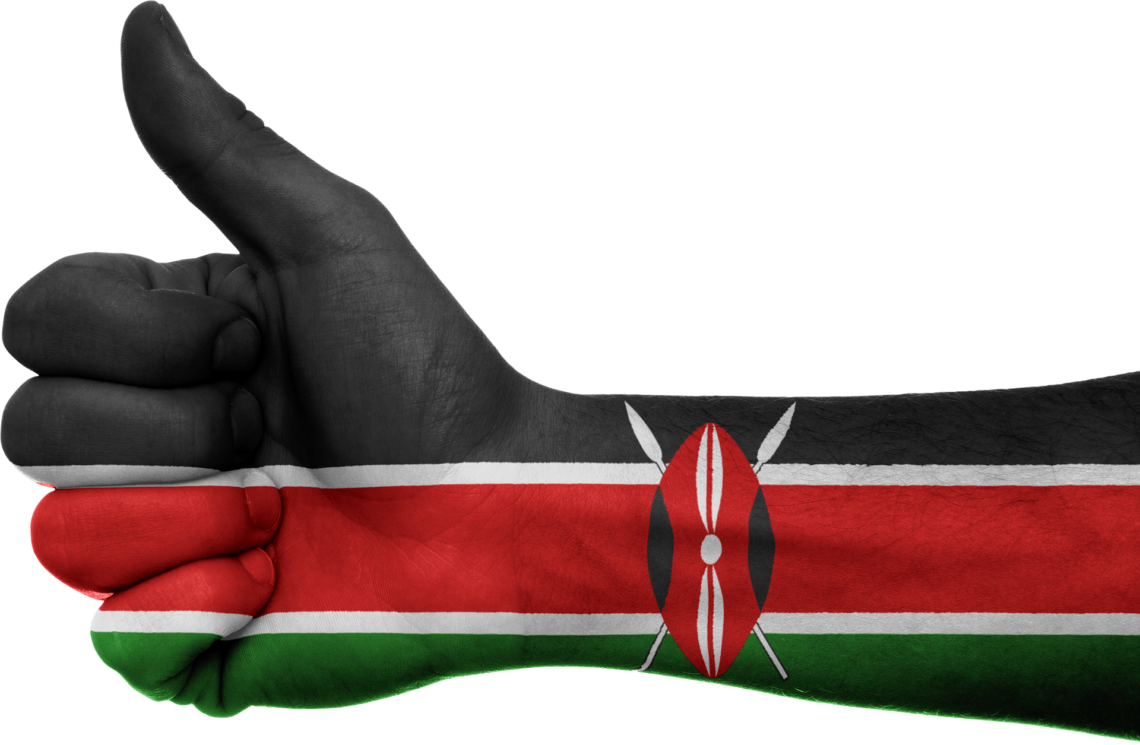
Kenya – 21 Things To Know Before Your Travel
Twenty one things that could be helpful for you to know for your travel to Kenya. Everyone before traveling to a new destination searches the web for travel tips and advice. Therefore, from my experience, I have put this list together, as all these things I would want to know before exploring a new destination. Enjoy reading!
Kenya is truly a stupendous country. The adventure starts from the time you arrive. Starting from Nairobi to the conservation camps, game drives, bush walks, the sundowners at the safari lodges, meeting with the renowned Maasai and Samburu tribes, scenic train journeys, to beaches in Mombasa and lots more. It has it ALL.
I have created a table of contents for easy browsing. Click on the points that interest you, and jump to that specific section. Happy hopping!
Table of Contents
21 Things to know before your travel to Kenya
1. What are the visa requirements for Kenya?
2. What vaccines are mandatory for travel to Kenya?
3. Best time to visit Kenya?
4. Kenya safe to travel?
5. Where and which local SIM to use during my stay in Kenya?
6. What currency to carry to Kenya?
7. What are some suggestions for souvenir shopping in Kenya?
8. Should I buy insurance policy for my travel to Kenya?
9. Is WIFI available in hotels/lodges/resorts in Kenya?
10. Do I need an international driving license for Kenya?
11. Tips on using public transport in Kenya.
12. Should I self-drive or book a package for Kenya?
13. What language do they speak and suggestions for interacting with people in Kenya?
14. What is Kenya’s local cuisine?
15. Kenya tipping guide.
16. What is the electricity voltage in Kenya?
17. Packing list for travel to Kenya.
18. Advice for your safari adventure.
19. Do you need a passport to travel within Kenya?
20. Can I request for a special meal at hotels/ lodges if I have dietary issues?
21. What are the emergency numbers to keep on hand while traveling in Kenya?
1. What are the visa requirements for Kenya?
Visa for Kenya is easy to obtain. Majority of the travelers are eligible for an electronic visa. The visa is normally processed within 48-hours. On the link provided above, you can apply for transit, tourist, and courtesy visa, applicable for diplomats. Single entry visa fee is USD50.00 while multiple entry fees is USD100.00. Few selected countries have visa exemption, while around seventeen countries need to apply directly with the Director of Immigration Service. All this information is available through the above-mentioned link.
2. What vaccines are mandatory for travel to Kenya?
Yellow fever certificate is mandatory to travel to Africa. Each country has its own designated clinics where this vaccination with a certificate is issued. Generally, local travel agents of a country have this information and can provide its clients with the center location and requirements.
Helpful Tip: You need to get this vaccination done at least 72 hours prior to your departure date. I would suggest you get the vaccine 96-hours prior to your travel. Reason for suggesting this is because, some people react to certain vaccines, so better to be early than late.
Centers for Disease Control and Prevention also advises travelers to get Hepatitis A and Typhoid vaccination to safeguard themselves against contaminated food or water. These vaccines are highly recommended especially for those who are planning to travel to rural areas or smaller cities.
Also, for your entire stay, it is advisable to carry with yourself anti-malaria medicine and need I mention, your prescribed medicines.
3. Best time to visit Kenya?
Kenya can be visited year-round. However, it is best to visit during the dry season. The recommended months are January, February, and then from June to October.
If you visit during the rainy season, April, May, November and December, then your game viewing schedule might get altered by your safari organizers and the terrain quality in the park is not the best. I have heard of safari vehicles getting stuck in the mud.
However, one positive aspect of traveling during the low season is that, overall you can get a better package deal, as low season rates are applicable during this time. Though I must add that, even though there is rainfall in December, due to Christmas and New Year holidays, the rates are not reduced. Instead, it is the opposite as resorts and lodges, they add a surcharge on 24th December, Christmas Eve, and on 31st December, New Year’s Eve. In addition, during this time some places also impose a minimum number of nights policy.
4. Kenya Safe To Travel?
During your travel to Africa, it is advisable not to flaunt that Rolex watch or that one-carat diamond ring. Less jewelry you wear, the better it is.
You have to be vigilant as the crime rate is high in Kenya. Curb your urge for taking a stroll after sunset. If you find yourself cornered by one or more people then, do not resist, give them what little you have.
Robberies are common in larger cities like Nairobi and Mombasa. Mugging, bag snatching is common in bazaars, in buses, on railway stations, and airports too. Therefore, be extremely careful with your valuables and listen to whatever advice your tour operator or hotel staff gives you.
Finally, if you are in the mood for exploring then, first check with the hotel concierge about the areas you are planning to visit, before venturing out. It’s better to be safe than sorry.
Also read the section, “Tips on using public transport in Kenya.”
5. Where and which local SIM to use during my stay in Kenya?
Before purchasing a local SIM, you need to consider the data package and the coverage it will provide.
Safaricom is the most popular SIM card. It has the best coverage and can be purchased inside the airport. However, if you arrive late at night then, you will have to purchase it from a kiosk near to the exit door.
They will also explain to you how to top-up with M-Pesa. This is a virtual banking system in Kenya and it is widely used by residents and tourists in Kenya.
Helpful Tips: Remember to take your passport copy to the shop where you are purchasing your SIM. Furthermore, never buy a SIM and leave the shop without checking the SIM first. Tell the person selling you the SIM to help you insert it in your phone and check that it works. Make sure to ask them how TOP-UP works for your SIM card, and where can you do it. Also, you should know the code to dial to check your balance.
6. What currency to carry to Kenya?
Kenyan Shilling is the local currency. You might also hear locals call the shilling ‘bob.’ When you hear this word then know that they mean shilling. The slang word for shilling originated during the colonial times.
As of now, the exchange rate is 1USD to KES107.00 The exchange rate varies. You can easily check the exchange rate on this website. However, keep in mind that, there might be a slight variance in the bank exchange rate.
USD, Pound Sterling, and Euros can easily be exchanged in Kenya for local currency.
My advice to you would be to get some Kenyan Shillings in different denominations from your bank in your home country. Small denominations are advisable as you might need some for your airport transfer, tipping the driver, porter, etc.
Furthermore, if you are going to exchange currency in Kenya then, the safest way is by going to a bank to do it. Carry with you your passport as they would need to see identification.
You can also use an ATM to withdraw cash. However, you need to be vigilant when withdrawing cash. Never use ATM machines at night as theft rate is high and robberies are common. As they say, experienced thieves can always differentiate a local from a foreigner. Just be sensible about the place from where you are withdrawing cash. Be alert, if someone is watching you or if you are not comfortable about your location then, forget the withdraw and go elsewhere.
Furthermore, credit cards like Mastercard and Visa are accepted in most hotels and shops in department stores. Small shops in cities, rural areas, or villages only accept cash.
Also read the section, “How to stay safe during your travel to Kenya?”
7. What are some suggestions for souvenir shopping in Kenya?
- Careful with what you buy, as you have to also carry it back home. For USA / Canada, 2 bags, baggage allowance total of 46kg per person is allowed. However, for other destinations, airlines offer only 30kg baggage allowance per person. So, if you have excess luggage then, you will either be leaving your bought souvenirs behind or paying extra at the airport.
- Only cash is accepted If buying something on safaris, in villages, small shops, or in rural areas.
- Do not buy things like ivory, fur, skin, or body parts of species as the immigration will not only confiscate it but they might also make you pay a hefty fine. So shop smartly and always check with your tour guide if in doubt of purchasing an item.
- Bargaining is a talent, either you have it or you don’t. Just like in other countries where there are markets, bazaars, and souks, bargaining is common. It is the same in Kenya. A general rule of the thumb that I apply when buying in such places is that I simply slash the price being asked for an item by half and then start bargaining. Sometimes if I really want the item and feel that it is worth it then, I don’t haggle too much. Furthermore, if you are buying from poverty-stricken area then a dollar or two won’t hurt you, but it might go a long way for the seller. Remember what Ellen Degeneres says, “Be kind to one another.”
Some items you might want to purchase:
- Maasai blankets.
- Ebony carvings.
- Masks
- Maasai shields and spears (of course of decent size so you can carry them in your suitcase).
- Handwoven baskets.
- Maasai beads.
- Handbags.
- Kenya t-shirts.
- Kangas (sarongs).
- Kenyan coffee/tea. This is a must-buy item by me.
Helpful Tips:
- If you have little more time and are planning to visit a few places in Kenya, then do some “window shopping.” Once you have a fair idea of prices then, you can make your first purchase. This method only works if you have some extra time on your hands and you are willing to let go of the first artefact that catches your eye.
- Lastly, if you want to visit a mall or two then, browse the list on Tripadvisor. They have mentioned all that are there.
8. Should I buy Insurance policy for my travel to Kenya?
Definitely! Anything can happen or go wrong during your travel, so I advise you to always buy travel insurance for any destination that you are traveling to. I always take the best insurance coverage, but again this is totally up to you to decide. I have used a few insurance companies in the past, however, World Nomad is my first choice.
9. Is WIFI available in hotels / lodges / resorts in Kenya?
The majority of the 5-star and 4-star hotels offer free wifi, while others charge a minimal fee. Check with your agent at the time of booking, if your selected accommodation offers free wifi or not. Or if you are booking on the net then simply call the hotel and reconfirm, if it is not mentioned online.
10. Do I need an international driving license for Kenya?
Yes, just like other countries, if you are planning to self-drive then you would require a valid international driving license. Rent-a-car companies will not let you rent a vehicle without one.
11. Tips on using public transport in Kenya.
Kenya is not like Hong Kong or Singapore when it comes to safety. You need to take the necessary precautions.
So, if you are looking for some thrilling road rides then, public transportation should be on your ‘to-do list.’
However, do remember that traffic rules are generally not followed especially by the mini-van (matatu) drivers. Their driving reminded me of local transport drivers of India and Pakistan. The matatus are decorated with posters, wordings, disco lights and other unimaginable things. The matatu driver is the road king. He is not afraid of anyone. Actually, he is the one, who invokes fear in others. You can easily spot him as he is the one driving the flamboyant matatu, with his music blaring as he twists and turns his matatu recklessly, and stops where ever he wants to.
The other mode of local transport which is popular are the ‘boda bodas.’ These are bicycles and motorcycle taxis and must I add that, they are equally rash drivers.
So, if you are not the type who likes roller coaster rides and you value your life then, stick to safer mode of transportation.
Lastly, domestic travel by train is extremely popular among the tourists. I had taken an overnight train from Nairobi to Mombasa in the 1980s, and it was an experience of a lifetime. Though now they have newer, faster trains which have reduced the overall journey time. If I were you, I would add this to the ‘to-do list.’
Besides the above, private hotel or Uber taxis are also easily available in cities like Nairobi and Mombasa.
Helpful Tips:
- Never take public transport at night. Always take a private or Uber taxi. Remember, as soon as you get into the vehicle, tell the driver to lock all the doors.
- If you are venturing out at night then, don’t carry too much cash or wear that Rolex and precious jewelry, even if you are traveling by private transport.
- If you are planning to experience public transport then be extremely careful of pickpockets.
Also read the section, “How to stay safe during your travel to Kenya.”
12. Should I self-drive or book a package for Kenya?
If I were you and traveling to Kenya for the first time then, I would choose to book a package through a reliable tour operator instead of taking the self-drive option. I can highly recommend Habib Tours for your travel to Kenya. They can tailor-make itineraries that offer the option of traveling in min-vans or land cruisers. Their safari vehicles are driven by knowledgable English speaking driver/guide. In addition, the vehicles have no A/C, as they come with a pop-up roof for maximum game viewing.
My travel company has been working with them for almost twenty years and I have never received a complaint regarding their overall service. Their entire team is highly professional. The only regret my clients say that they have is that, “I wish I had an extra night or two at the Maasai Mara or…”
Furthermore, considering you don’t speak the local language, not familiar with the roads, numerous security issues that exist and unknown safari terrain, only to highlight a few things. Therefore, my suggestion, don’t be a daredevil on your first trip. You can always be the safari adventurer on your second trip to Kenya.
Feel free to also contact me to discuss your itinerary.
13. What language do they speak and suggestions for interacting with people in Kenya?
Kenya is an amazing country with charming, friendly, and welcoming individuals. They are polite, hospitable people with whom you can easily strike a conversation.
The global rule applies here as well. Kenyans will always welcome a foreigner who understands and respects their culture.
Swahili is the local language of Kenya. However, there are many other tribal dialects that are spoken in rural areas. Due to its colonial history and rise in tourism, the English language is widely spoken by the locals, so making yourself understand is not as difficult as it was in the 1970 or 1980s.
Furthermore, similar to other countries, when you speak the local language, you make an immediate connection. It is the same in Kenya. Show them that you have made an effort to learn a few words of Swahili and even if you are little off with your pronunciation, at least you and the other person will smile and start off a conversation about your mispronounced word.
Few suggested Swahili words for you to learn for your journey.
Jambo – Hello
Habari gani – How are you?
Nzuri – Fine
Nzuri Sana – I am very well or very good
Asante sana – Thank you very much.
Tutaonana tena – We will see each other again.
Use these and other Swahili words and you just might end up making a new friend.
14. What is Kenya's local cuisine?
The staple food of Kenya is maize. It is made into a mash called, ‘ugali.’ It can be served with variety of things like; steamed leaf vegetables (sukuma wiki), beans, various meats, and it is eaten with hands instead of cutlery.
For beer lovers, Kenya brews its own beers with locally sourced barley. Try it out and tell me in the comments below, which one you had and what was the taste like?
15. Kenya tipping guide.
In Kenya, like many other countries around the world, the hospitality industry employees are not in the high salary bracket and they rely heavily on tips. So, here are some suggestions on gratuity amounts or percentage that you can follow and not break into a sweat when time comes for tipping. After having said this, if you are feeling generous, then go ahead, give as much as your pocket allows you to.
- Airport transfer – If the driver helped you with your luggage and you had a friendly chatty drive to your destination, then sure he deserves a tip. Minimum tip amount USD2.00
- In restaurants – Take out 10% of the total bill and give that amount as a tip. If food was finger lickin’ good and service was impeccable, then give more if you want to.
- Full-day / half-day tour drivers – USD1.00 to 3.00 (KES100.00 to 300.00), plus you can offer them a soda or a cigarette, of course only if you smoke. (Good way to learn more about the wilderness).
- Safari guide – USD10.00 per day. Give him a lump sum amount at the end of the safari tour. I am an eccentric person, so I actually carry decorated, small envelopes in which I put my money with a thank you note. It just makes it special and memorable for the person you are giving it to.
- Private taxi drivers – Gratuity depends on distance and time. The short rides get less and long drives get more. The range is from USD5.00 to 10.00. If the distance is more than an hour’s drive then go with the rule, 10% of the total bill.
- Limousine drivers – Anywhere from 15 to 20% of the total bill.
- Parking valets – USD2.00 to 5.00.
- Hotel porter – USD2.00. Or more, if you wish.
- Housekeeping – It depends on the length of your stay. Shorter stay give less and for a stay of one week or more, give a bigger tip. Range from USD2.00 to 10.00 or more if you are staying longer than a week.
Lastly would like to say that, tip in Kenyan Shilling and not in USD. Most of them don’t even have a bank account, therefore they prefer their local currency.
16. What is the electricity voltage in Kenya?
In Kenya the standard voltage is 240V and power plugs and sockets are type G.
If you are from a country which has a different voltage, then you must carry a travel adaptor, unless your electric items have dual voltage adjuster.
17. Packing list for travel to Kenya.
- Best are the khaki trousers, t-shirts and a light jacket or sweater for the chilly nights. Be sensible and don’t carry tank or crop tops with leather pants and high heels. You are going for a safari, so dress appropriately.
- Carry your camera with an extra battery. Trust me you will be taking zillions of photographs and the extra battery will be really handy.
- Laptop or notebook with your charger. I cannot live without my Apple iMac.
- Your Phone and charger. As a backup, I also carry my phone power bank. I keep this charged all the time. Helpful tip. Put your phone and other equipment for charging at night before going to bed, so in the morning you don’t have to see the unwanted red blinking light.
- Sunglasses. Put two if you need to, but my friend don’t forget this. You will really need it.
- Sun brimmed hat is the best or a cap. Believe you me, you will need this.
- Sunscreen – I always carry an extra tube. I can’t have enough of this.
- Comfortable shoes. My darling ladies and gentlemen, safaris are not a trip to Paris. So, forget your loafers, Testoni, and Jimmy Choo shoes. Instead, carry comfortable sneakers or tracking boots. Casual flats or flip flops will also come handy.
- Insect repellent. I am highly allergic to flying insects. I wish I could carry a small suitcase full of these insect repellent spray bottles. Along with this, don’t forget your anti-allergy medicine. Don’t laugh at me, I know I am a finicky traveler.
- If you are traveling during the summer months then, you must carry a swimsuit along with a sarong. You can also buy a lovely sarong in one of the bazaars. They are easy to find.
- Ladies especially, make sure you are carrying your toiletries stock. You might not find a shop that carries what you need. So, better to be prepared.
- Prescription medicines. I always count my travel days and pack all my meds in a plastic sealed bag. The plastic bag also makes it easy for custom officers to see the medicines.
- Binoculars – If you have, then you must carry. After all, you are going for a safari and not to New York.
- Small Swiss Army Knife. I carry mine on all my trips. It is a real handy item. Be smart and please don’t pack it in your hand carry as customs at the airport will confiscate it.
18. Advice for your safari adventure
- Under no circumstance approach a wild animal during your safari, even if it seems harmless or playful. Read my article on Red Buttock Baboons of Kenya and you will know what I mean.
- Mosquito repellent. Carry as many repellent sprays as you like. Read my feelings about this item in the, ‘Packing list for travel to Kenya.’
- Pack light as I am sure you plan on buying some African souvenirs to take back home. Also, if you are planning to do some internal flying in a small aircraft, then for sure travel light. They have strict luggage allowance policy.
- As mentioned above, dress appropriately. Neutral colors are good. Stay away from dark colors. I am sure you don’t want to attract animals and mosquitoes to yourself.
- During your safari tours, you will get the opportunity to visit villages or maybe along the highway you will stop by some small shops and see children playing. So, why not carry with you small diaries, notebooks, pencils with eraser heads, pens or any other small items that you think you can gift to the children that you might come across. A small kind gesture will go a long way and there is no thank you bigger than the smile you will bring on a child’s face with the small gift that you will give.
- In the rural areas, the African culture is conservative, so avoid short skirts, mini-dresses, shorts. Women especially should dress modestly.
- Drink only mineral bottled water. Stay hydrated during your safaris, especially during the sweltering summer months.
19. Do you need a passport to travel within Kenya?
Yes, you need your identification. Some tourists carry a photocopy of their passport. However, I would suggest that you keep your original passport with yourself at all times. Due to the past terrorist attacks and to maintain safety for all, the police randomly stops people for security checks, and a photocopy is unacceptable. Therefore, it is best to keep your original passport with yourself to avoid unnecessary hassle.
20. Can I request for a special meal at hotels/ lodges if I have dietary issues?
Yes, you can advise your special diet to your tour operator at the time you book your package. Furthermore, the travel agent will be able to advise you in which resort/hotel a special meal can or cannot be arranged.
21. What are the emergency numbers to keep on hand while traveling in Kenya?
Kenya Tourist Safety and Communication Center is open 24/7. For easy reference, I have listed below a few ‘must-have’ on hand numbers for emergency purposes.
Emergency Numbers:
Police / Fire / Ambulance
Dial 999
Tourist Safety Hotline 24/7:
Dail +254(020)604767
Nairobi Police Hotline:
Central Police Station
+254(020)222222
Jomo Kenyatta International Airport Police
+254(020) 823888
Mombasa Police Hotline:
Central Police Station +254(041)2225501
Police Headquarters
+254(041)2311401
Make sure to pin this post if you found it interesting!
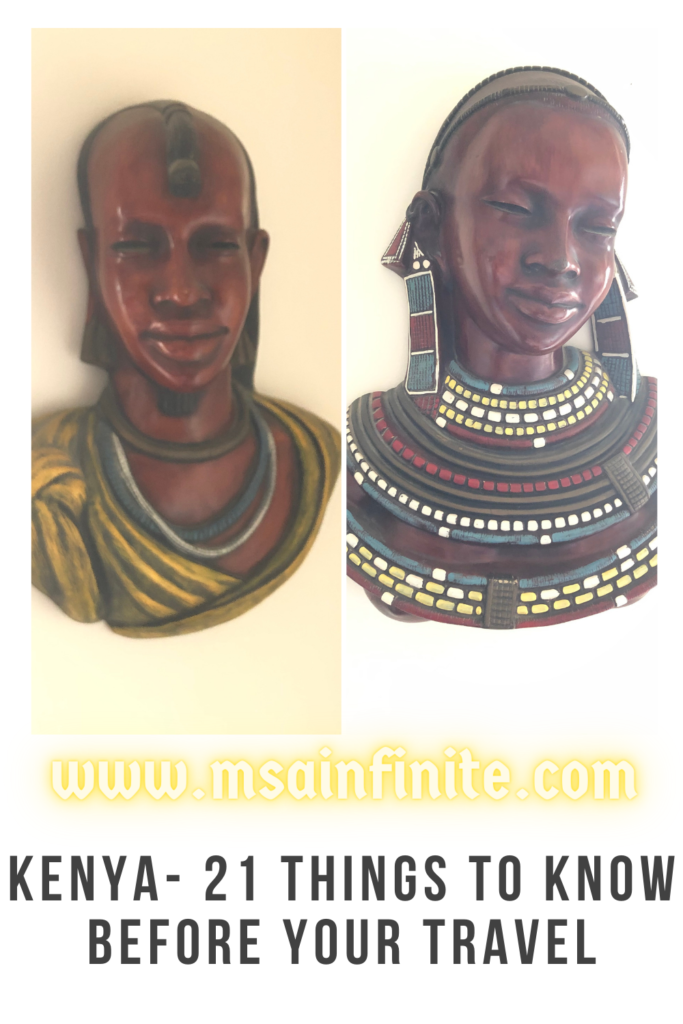
Like this article? Then, please read:


You May Also Like
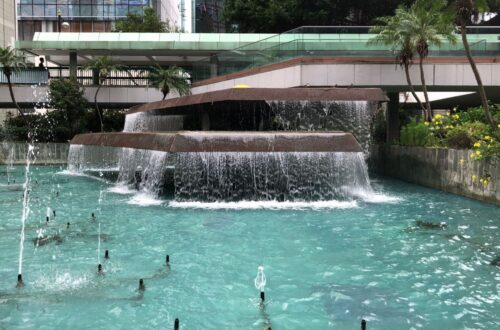
Love Letter To Hong Kong – My Bestie
October 6, 2020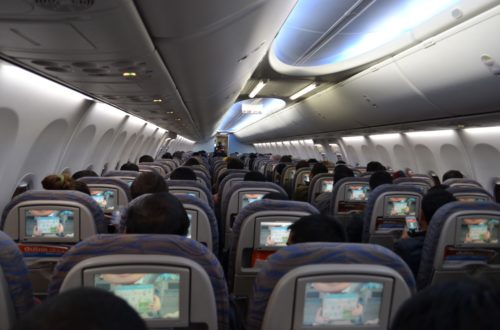
7 Memorable In-flight Travel Experiences
April 19, 2020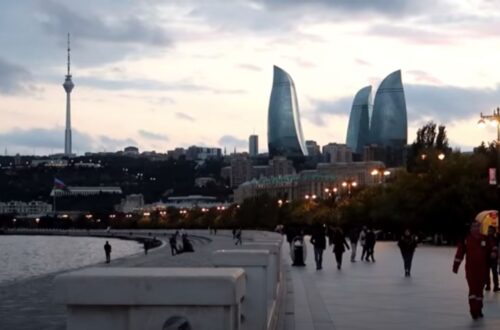

14 Comments
Nasir
A very informative and detailed guide for people planning a visit to Kenya. The writer has covered many topics like sim cards and banks which are usually overlooked.
A must read before planning your tour.
MSAInfiniteMonkey
Hello Nasir,
Thank you so much for your wonderful compliment. I hope you will read my other posts too. Have a fantabulous day!
Sabreena
Outstanding article on Kenya forget about all the guidebooks this blog has everything will definitely recommend to anyone considering to travel to Kenya 👍👏👏
MSAInfiniteMonkey
Hello Sabreena,
Thank you so much for your great compliment. You brought a smile to my face. Please read my other posts too. Wishing you a fantabulous day!
Nasser
Great article on Kenya, asante sana. Now I’ve learned a few words in swahili. I would love to visit the country one day. 🙂
MSAInfiniteMonkey
Hello Nasser,
Asante Sana 🙂 for leaving a comment that brought a smile to my face. Please read my other posts too. Wishing you a fantabulous day!
Amir Baloch
Absolutely brilliant. Kenya was never on my list of countries to visit, but after reading thia article, IT IS. You’ve covered pretty much everything an independent traveler such as myself looks for. Kudos. Please keep going with posts similar to this one. Thank you. God bless. 🙂
MSAInfiniteMonkey
Hello Amir Baloch,
Thank you so much for your great compliment. You brought a smile to my face. Yes, will keep adding more post on Kenya and other destinations posts soon will be online too. Please do read my other posts too. Wishing you a fantabulous day!
Nina
Fantastic blog. Spot on. Has all the information required. Kenya without a doubt is definitely one of the most beautiful places you can visit.
MSAInfiniteMonkey
Hello Nina,
Thank you for your wonderful compliment, it brought a smile to my face. I agree with you that Kenya is an amazing country to live and visit. Wishing you a fantabulous day!
Kariss Ainsworth
This is such a useful, in depth post! Thank you for this
MSAInfiniteMonkey
Hello Kariss,
Thank you for reading the article and thanks so much for your comment.
Wishing you a fantabulous day!
EvBeing
Great post! I have been twice to south africa Thanks for mentioning all the safety tips you are absolutely right! I love exploring Africa and hope to travel back to Kenya
MSAInfiniteMonkey
Hello Evbeing,
Thank you for reading the article and thanks so much for your comment. South Africa is on my bucket list. Hopefully soon 🙂
Wishing you a fantabulous day!